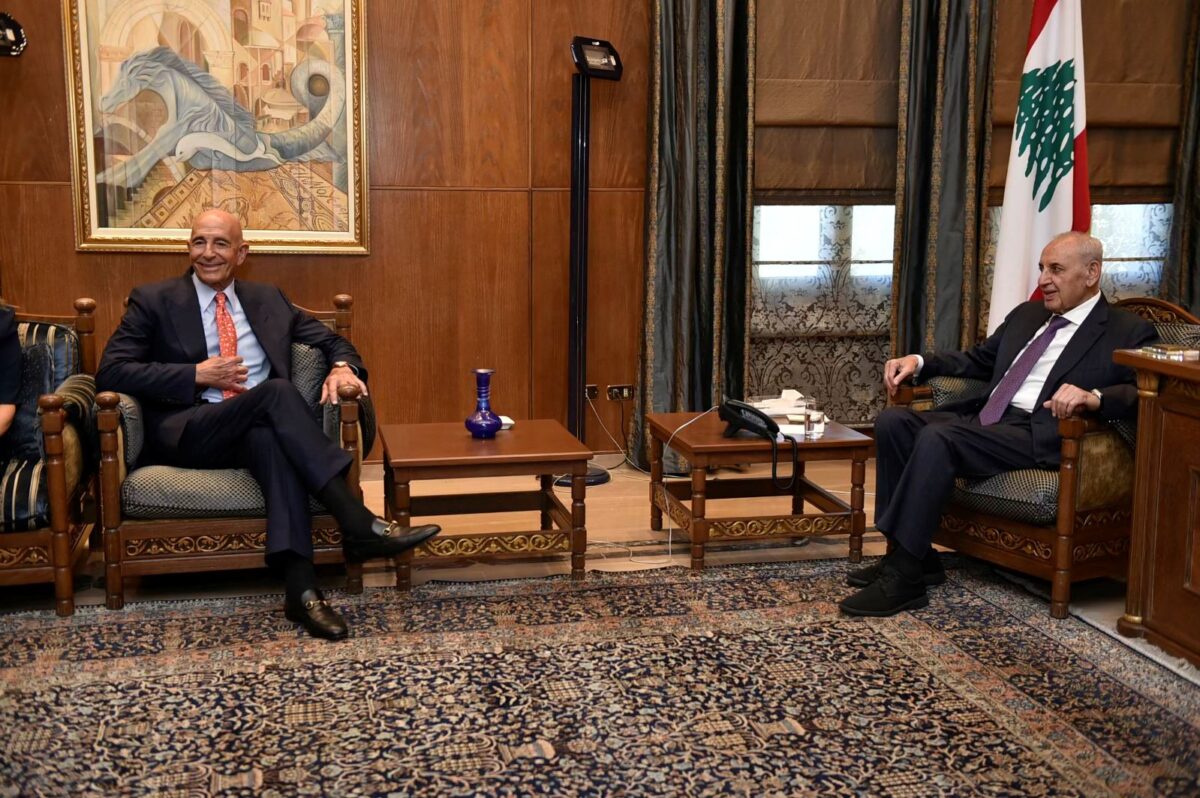
Last week, U.S. Presidential Envoy for Syria Tom Barrack made a brief yet noteworthy stop in Lebanon, meeting with the country’s top officials. His visit came as part of an ongoing international effort to remind Lebanon’s leadership of its long-overdue commitments—chief among them, disarming Hezbollah and initiating long-promised political and economic reforms, in that precise order.
Lebanese officials welcomed Barrack with a warmth that stood in sharp contrast to their reception of his predecessor, Morgan Ortagus. While Ortagus was known for her bluntness and refusal to sugarcoat criticism, Barrack arrived cloaked in diplomatic finesse. Yet this contrast is deceptive: Barrack may prove even more uncompromising than Ortagus. His mission is not just to talk reforms but to ensure the dismantling of what remains of Iran’s paramilitary arm in Lebanon.
A man of Lebanese (Zahlé) origin, Barrack fancies himself the architect of an “Abrahamic Peace” between Syria and Lebanon on one side, and Israel on the other. It’s a vision he pledged personally to his close friend, former President Donald Trump: that both Syria and Lebanon will eventually join the Abraham Accords. It’s a reality that Lebanon’s top officials—President Joseph Aoun, Speaker Nabih Berri, and Prime Minister Nawaf Salam—seem determined to ignore, choosing instead to dwell on Israel’s occupation of the five border hills while sidestepping any concrete roadmap for disarmament south of the Litani River or elsewhere.
Barrack’s visit, in this context, aimed not just to mediate Lebanese-Israeli tensions but also to address the lingering dispute between Lebanon and Syria over the Shebaa Farms—a file long exploited by Bashar al-Assad’s regime to justify Hezbollah’s continued armament. On the Syrian front, Barrack’s close relationship with President Ahmad al-Sharaa and their alignment on key issues, especially Syria’s potential peace with Israel, now puts Lebanon in a new and uncomfortable light: that of the spoiler.
While many in Lebanon claimed that the main obstacle to peace lies in Damascus, Syria’s current leadership appears increasingly pragmatic. It seeks peace not to appease Trump or Netanyahu, but because national self-preservation demands it. Lebanon, by contrast, remains mired in the political black hole of the Palestinian cause—weaponized by factions who have long benefitted from perpetual crisis.
In terms of international and regional support, Syria today outpaces Lebanon. Despite the slow pace of state reconstruction and the looming threats of ISIS—both in its original form and in its Iranian-backed offshoots—Syria is advancing on a path of calculated recovery. Lebanon, on the other hand, remains in deep denial about changing regional dynamics. The recent war on Iran was not merely aimed at breaking the “Axis of Resistance”; it was also intended to shatter one of Lebanon’s most harmful delusions: its exaggerated sense of uniqueness and political cleverness.
Thus, the presumed “Tom Barrack Doctrine” may look appealing on the surface, but at its core, it reflects the transactional realism of the Trump doctrine: nothing is given for free. When Barrack sits in Nabih Berri’s salon, he expects to be addressing the Speaker of Parliament—not the leader of a political militia nor Hezbollah’s primary enabler. Otherwise, in classic Trumpian fashion, sanctions are on the table.
Like many in the Trump sphere, Barrack hails from the world of business and investment. Lebanese politicians, by contrast, behave like street peddlers of political scrap—“selling by the piece” and assuming that private conversations carry no consequences. They think they can dodge the regional wave of normalization, even when it could benefit their own people.
But such political gamesmanship may well backfire. In their smugness, Lebanon’s ruling class might end up accelerating the one outcome they fear the most: their own irrelevance and ultimate demise.
This article original appeared in Nidaa al-Watan
Makram Rabah is the managing editor at Now Lebanon and an Assistant Professor at the American University of Beirut, Department of History. His book Conflict on Mount Lebanon: The Druze, the Maronites and Collective Memory (Edinburgh University Press) covers collective identities and the Lebanese Civil War. He tweets at @makramrabah







